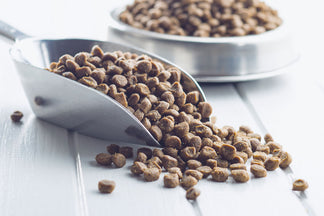In the last post, “How Much Does it Cost to Have a Chubby Pet?”, we discussed the alarming facts and figures related to the national pet weight/obesity problem. Today we will talk about how you can evaluate if your pet is overweight and identify some of the more common paths to weight gain.
How can I tell if my pet is overweight?
There are several ways to determine if your pet is overweight. First and foremost, you should check in with your vet! They can advise you as to a safe and proper target weight for your pet. There are some other great resources that are available as references in the event that you want to do a little research ahead of your vet appointment:
- Purina Body Condition Score. The “gold standard” for assessing whether or not your pet is over (or under) weight is the Purina Body Condition Score. You will probably recall seeing this iconic visual at your vet’s office or while you were surfing the web. Purina uses a scale of 1-10 with 1 being the most thin and 10 being the most fat and 5 being “just right”. Purina provides pictures along with descriptions of what to look for to assess your pet’s condition. Remember to look at both the top and side views of your dog/cat. Be honest with your assessment as you view and your pet!
- Statistics. Yes, I said statistics but don’t run and hide. In this case, I am referring to your breed’s average weight and the range of weights most normally seen in your breed of pet. The Association of Pet Obesity Prevention provides a list of ideal weight ranges for dogs and cats by breed. Please be aware that even if your dog or cat is heavier than the normal upper value for their breed, it does not guarantee that you pet is overweight. As with people, some dogs and cats have bigger frames or more muscle than average for a given breed and these stats do not reflect that.
How did this happen?
OK, let’s say that your pet is overweight. I am sorry to say, but this is not a “pet problem” it is a “people problem”, so don’t get mad at Fido or Whiskers. The way that you and your family interact with and care for your pet is the primary reason that your pet is overweight (notwithstanding the occasional cases where your pet has a medical issue driving the weight gain).
It can be very helpful to reflect back and try and uncover some of the reasons why this happened. Here is a list of some common human behaviors that can lead to weight gain.
- Lack of knowledge about how much you should feed your pet given their age and activity level.
- Failure to properly measure food servings.
- Failure to account for ‘treats’ and human snacks that are provided to your pet each day.
- Lack of proper exercise for your pet.

 Food
Food
 Food
Food
 Food
Food
